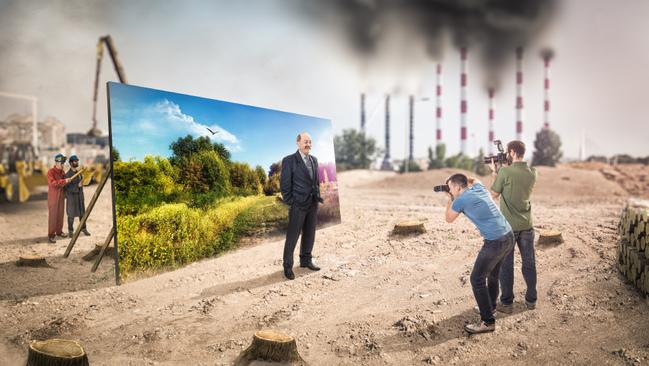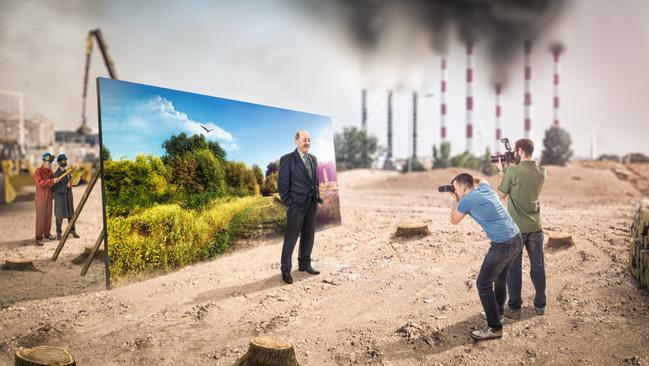You don’t need to be a greenie to know this is wrong
If you live near a CBD and don’t have a monstrosity going up nearby, you soon might. Just don’t expect to be told about it in advance, or to have a say on how your neighbourhood looks.

Rendezview
Don't miss out on the headlines from Rendezview. Followed categories will be added to My News.
As if it wasn’t enough, Joni Mitchell, that they paved paradise and put up a parking lot.
Now, even parking lots aren’t safe — they’re being turned over to high-density housing as Australian cities struggle to meet the needs of a growing populations.
If you live within cooee of any CBD and don’t have a monstrosity going up near you, you soon might.
Just don’t expect to be told about it in advance, or given the opportunity to have your say on how your neighbourhood should look.
“Secret” land deals and inflated prices for prized parcels of dirt are only the half of it.
The legal framework around planning — not only affecting Brisbane but regional centres and coastal hot spots — is flimsy, vague and vexing.
A cynic might say the laws are deliberately so, to deter ordinary citizens from getting involved and making life harder for developers and the politicians who pander to them.
What is undeniable is that more and more applications are being classified under planning schemes as code assessable, not impact accessible.
This means approval will be based on whether developments meet a basic code for high, medium or low density, instead of how the environment, infrastructure and neighbours will be impacted.
Code-assessable developments are not open for public submission and appeal so can be pushed through with relative ease.
Witness the fiasco over three houses in Brisbane’s Jones Street at Highgate Hill.
No matter that homes built before 1911 and listed on the Brisbane City Council’s city plan 2000 should be protected.
These dwellings somehow weren’t on the list so a developer got the nod to pull them down and build a five-storey unit block that complies as “medium-density residential”.
You have to wonder how many more homes have or will slip through the cracks or simply vanish before residents have any clue.
The greatest casualty in this race to develop is green space — parks, trees, backyards.
Paradoxically, the response to accommodating more people is environments that are increasingly people-unfriendly.
Lawyer Jo Bragg, CEO of Queensland’s Environmental Defenders Office, says the planning system is “seriously flawed” and “there are not enough parks for all the new developments going up”.
“Developers often have to pay an infrastructure charge (that includes sewerage) but they fight politically to keep costs down, and council often uses the levy to maintain existing space, not buy more.
“The system has become weak and wobbly,” Braggs says.
“Public space is expressed as a ‘desired’ amount, which is frequently not achieved because cash contributions are used for facilities like barbecues or outdoor gyms.”
What will our communities look like in five, 10 or 50 years’ time if we do not mandate for green space?
What will be the human toll of a disconnect with nature?

Kids are already glued to the internet for 18 hours a week and doing exercises for their tech-weary fingers, as The Courier-Mail has reported, and a growing number are battling obesity, lifestyle-related diabetes and poor mental health.
If time outdoors — which research shows boosts resilience, creative thinking and physical fitness — is further stymied by an unsympathetic built environment, what hope is there for future generations?
What’s more, if children don’t learn to appreciate nature, how can they be motivated to protect it as adults?
Tim Gill, a UK expert on the built environment, says sustainable, liveable neighbourhoods are shrinking and with them, young people’s horizons.
“Where is the vision?” says Gill, who will address Nature Play community forums across Queensland this month.
“It’s not enough to have a few slides in a park. We want children to become citizens of their neighbourhood, and this means creating areas that are unstructured, safe and free.”
The challenge for communities is, and always has been, to balance competing interests.
Yes, we need more affordable housing, but not at the expense of green space and people’s health and wellbeing.
It’s not an impossible ask.
A few years ago in Dapto, a suburb of Wollongong in regional NSW, Stockland brought in students from the local primary school to consult on a housing development.
Not only did developers ask kids what they wanted, they incorporated their requests.
Karen Malone, an education professor at the University of Western Sydney, studied the collaboration and how children became “effective environmental change agents”.
Kids were clear on what they wanted: parks they could walk to, and “lots of nature”.
And get this: when given the choice, they were far more interested in playing sport and catching frogs than watching TV and using computers.
Children did not want a “steel-and-plastic playground”, Malone says, but green space that encouraged them to take risks and explore, and that could be used by everyone.
Developers and governments must be held accountable for delivering places people want to live in, and citizens must keep the pressure on.
We need clear rules in our local, regional and state planning schemes, rules that respect the human scale of communities and guarantee additional green space.
Developments that impact on people — that would be most of them — must be classified and assessed as such, to give rate payers real leverage to achieve better outcomes.
Kylie Lang is associate editor of The Courier-Mail
kylie.lang@news.com.au
Originally published as You don’t need to be a greenie to know this is wrong


